- Home
- Elizabeth George
This Body of Death Page 18
This Body of Death Read online
Page 18
Bella was going through the mental preparation for such a conversation when the bell went on the front door down below. She gathered up her cleaning supplies, removed her Marigolds, and huffed down the stairs. The bell rang again, and she shouted, “Coming,” and she opened it to see a girl on her porch, rucksack at her feet, hopeful expression on her face. She didn’t look English to Bella, and when she spoke, her voice gave her away as someone from what had once probably been Czechoslovakia but was now any one of a number of countries with many syllables, even more consonants, and few vowels, because Bella could not keep track of them and no longer tried.
“You have room?” the girl said hopefully, gesturing in the direction of the dining room window where the room-to-let sign was displayed. “I see your notice there … ?”
Bella was about to tell her yes, she had a room to let, and how are you at obeying rules, missy? But her attention shifted to movement on the pavement as someone dodged behind what shrubbery managed to grow in her front garden among the plethora of recycling bins. It was a woman moving out of sight, a woman in a tailored wool suit, despite the heat, with a brightly patterned scarf—her sodding trademark, that was, Bella thought—folded into a band and holding back masses of dyed orange hair.
“You!” Bella shouted at her. “I’m ringing the cops, I am! You’ve been bloody told to stay away from this house and this is the limit!”
WHETHER THE ACTIVITY was going to eat up time or not—and Barbara Havers knew which alternative was actually the case—there was no way she was going to face the sister of Simon St. James in her current getup and with her face attempting to divest itself of its smear of makeup through the means of excessive perspiration. So instead of heading from Chelsea directly to Bethnal Green, she drove home to Chalk Farm first. She scrubbed her face, breathed a sigh of relief, and decided to compromise with the weeest bit of blusher. She then went for a change of apparel—hallelujah to drawstring trousers and T-shirts—and having thus resumed her normal state of dishabille, she was ready to face Sidney St. James.
Her conversation with Sidney was not effected immediately, however. Upon leaving her tiny bungalow, Barbara heard her name called out by Hadiyyah, crying from above, “Hullo, oh hullo, Barbara!” as if she hadn’t seen her in an eon or so. The little girl went on enthusiastically with, “Mrs. Silver is teaching me how to polish silver today,” and Barbara followed the sound of the voice to see Hadiyyah hanging out of a window on the second floor of the Big House. “We’re using baking powder, Barbara,” she announced and then she turned as someone within the flat said something to which the little girl corrected herself with, “Oh! Baking soda, Barbara. ’Course Mrs. Silver doesn’t ackshully have any silver, so we’re using her cutlery, but it makes the cutlery shine so. Isn’t that brilliant? Barbara, why’ve you not got on your new skirt?”
“End of day, kiddo,” Barbara said. “It’s mufti time.”
“And are you—” Hadiyyah’s attention was caught by something beyond Barbara’s line of vision because she interrupted herself with, “Dad! Dad! Hullo! Hullo! Sh’ll I come home now?” She sounded even more enthusiastic about this prospect than she had about seeing Barbara, which gave Barbara an idea of how much the little girl was actually enjoying learning yet another of Mrs. Silver’s “housewifely skills,” as she called them. So far in the summer they’d done starching, ironing, dusting, hoovering, removing scale from toilet bowls, and learning the myriad uses of white vinegar, all of which Hadiyyah had obediently mastered and then dutifully reported to Barbara and demonstrated either for her or for her father. But the bloom had faded from the rose of acquiring domestic skills—how could it be otherwise, Barbara thought—and while Hadiyyah was far too polite to complain to the elderly woman, who could blame her for embracing the thought of escape with a joy that daily increased?
Barbara heard Taymullah Azhar’s response, muted, from the direction of the street. Hadiyyah’s hand fluttered in farewell to Barbara, she disappeared within the flat, and Barbara herself continued down the path that followed the side of the house, emerging from beneath an arbour fragrant with star jasmine to see Hadiyyah’s father coming through the front gate, several carrier bags dangling from one hand and his worn leather briefcase in the other.
“Polishing silver,” Barbara said to him by way of greeting. “I’d no idea baking soda worked a trick on tarnish. You?”
Azhar chuckled. “There appears to be no end to the domestic knowledge of that good woman. Had I had it in mind that Hadiyyah should spend her life in housekeeping, I could not have found her a better instructor. She’s quite mastered scones, by the way. Have I mentioned that?” He gestured with the hand that held the carrier bags. “Will you join us for dinner, Barbara? It’s chicken jalfrezi with pilau rice. And as I recall”—with a smile that showed the sort of white teeth that made Barbara swear she would see the dentist in the near future—“those are among your favourites.”
Barbara told her neighbour she was sorely tempted, but duty called. “Just on my way out,” she said. Both of them turned as the front door of the old house opened and Hadiyyah clattered down the steps. She was followed closely by Mrs. Silver, tall and angular, ensconced in an apron. Sheila Silver, Barbara had learned from Hadiyyah, possessed an entire wardrobe of aprons. They were not only seasonal, they were celebratory as well. She had Christmas aprons, Easter aprons, Halloween aprons, New Year’s aprons, birthday aprons, and aprons commemorating everything from Guy Fawkes Night to the ill-fated marriage of Charles and Diana. Each of these was complemented by a matching turban. Barbara reckoned the turbans had been fashioned from tea towels by their wearer, and she had little doubt that when the list of housewifely duties had been mastered by Hadiyyah, turban making would be among them.
As Hadiyyah flung herself in the direction of her father, Barbara waved a farewell. Her last sight of them was of Hadiyyah—arms round Azhar’s slender waist—and Mrs. Silver in gangly pursuit of her, as if the girl’s escape had been preemptive and more information about baking soda needed to be imparted.
In her car, Barbara gave a thought to the time of day and concluded that only a bout of creative rat running would get her to Bethnal Green before nightfall. She skirted as much of the City as she could, ultimately coming on Bethnal Green from Old Street. This was an area that had altered much over the years, as young professionals unable to afford the prices of central London’s housing moved in an ever-widening circle to embrace parts of town long considered undesirable. Bethnal Green was hence a combination of the old and the new, where sari shops mingled with computer sales centres, and ethnic enterprises like Henna Weddings stood next door to estate agents flogging properties to growing families.
Sidney lived in Quilter Street, a terrace of plain-fronted houses constructed of London brick. A mere two storeys tall, they comprised the south side of a triangle at the centre of which was a common area called Jesus Green. Unlike so many small parks in town, this one was neither locked nor barred. It was fenced in wrought iron, which was typical of London’s squares, but the fence was only waist high and its gate stood open to admit anyone who wanted access to its wide lawn and to the pools of shade offered by the leafy trees that towered over it. Children were playing noisily on the green near to where Barbara parked her old Mini. In one corner a family was having a picnic, and in another a guitarist was entertaining a young adoring female. It was a very good place to escape the heat.
Sidney answered the door to Barbara’s knock, and Barbara tried not to feel what she indeed was in the presence of St. James’s younger sister: a frightening contrast. Sidney was quite tall, she was slender, and she was naturally in possession of the sort of cheekbones that women happily went under the knife to acquire. She had the same coal-coloured hair as her brother and the same blue-today-and-grey-tomorrow eyes. She was wearing capris, which emphasised legs that went from here to China, and a cropped tank top that showed off her arms, disgustingly tan like the rest of her. Large hoop earrings dangled from her
ears, and she was removing them as she said, “Barbara. I expect the traffic was a nightmare, wasn’t it?” and admitted her into the house.
This was small. All the windows were open, but that was doing little to mitigate the heat inside. Sidney appeared to be one of those loathsome women who did not perspire, but Barbara was not among their number, and she could feel the sweat popping out on her face the moment the front door closed behind her. Sidney said sympathetically, “Terrible, isn’t it? We complain and complain about the rain, and then we get this. There should be some middle ground, but there never is. I’m just this way, if you don’t mind.”
Just this way turned out to be a staircase. This rose towards the back of the little house, where a door stood open to a small garden from which the sound of vicious pounding was emanating. Sidney went to the door, saying over her shoulder to Barbara, “That’s just Matt.” And into the garden, “Matt, darling, come and meet Barbara Havers.”
Barbara looked past her to see a man—burly, shirtless, and sweating—who was standing with sledgehammer in hand, apparently in the process of beating a sheet of plywood into submission. There seemed to be no reason for this unless, Barbara thought, he was going for a rather inefficient means of creating mulch for the single, sun-parched herbaceous border. At Sidney’s call, he didn’t stop what he was doing. Rather, he glanced over his shoulder and nodded curtly. He was wearing dark glasses, and his ears were pierced. His head was shaved to the skull, and like the rest of him it shone with sweat.
“Gorgeous, isn’t he?” Sidney murmured.
It wouldn’t have been Barbara’s word of choice. “What’s he doing, exactly?” she said.
“Letting it out.”
“What?”
“Hmmm?” Sidney gazed at the man appreciatively. He didn’t appear particularly handsome, but he had a body completely defined by muscle: an eye-catching chest, narrow waist, serious lats, and a bum that would have got him pinched just about anywhere on the planet. “Oh. Aggression. He’s letting it out. He hates it when he’s not working.”
“Unemployed, is he?”
“Good heavens, no. He does …oh, something or other for the government. Come up above, Barbara. D’you mind if we talk in the bathroom? I was giving myself a facial. Is it all right if I get on with it?”
Barbara said it was fine by her. She’d never seen a facial being given and now that she was on her relentless course of self-improvement, who knew what tips she might pick up from a woman who’d been a professional model since she was seventeen? As she followed Sidney up the stairs, she said, “Like what?”
“Matt?” Sidney clarified. “It’s all top secret, according to him. I expect he’s a spy or something. He won’t say. But he goes off for days or weeks and when he comes home, he fetches the plywood and beats the dickens out of it. He’s between jobs at the moment.” She glanced back in the direction of the pounding, concluding with a casual, “Matthew Jones, man of mystery.”
“Jones,” Barbara noted. “Interesting name.”
“It’s probably his whatever …his cover, eh? Makes it all rather exciting, don’t you think?”
What Barbara thought was that sharing lodgings and a bed with someone who pounded upon wood with a sledgehammer, possessed shady employment, and had a name that might or might not be his own was akin to playing Russian roulette with a rusty Colt .45, but she kept that to herself. Everyone’s boat floated on different water and if the bloke below rang Sidney’s chimes—not to mix too many metaphors, Barbara thought—then who was she to point out that men of mystery were frequently men of mystery for reasons having nothing at all to do with James Bond. Sidney had three brothers who were doubtless doing their share of pointing that out to her.
She followed Sidney into the bathroom where an impressive lineup of jars and bottles awaited them. Sidney began with the removal of her makeup, chattily explaining the process—“I like to tone, first, before I exfoliate. How often d’you exfoliate, Barbara?”—as she went along.
Barbara murmured appropriate responses, although toning sounded like something one did in a gym and exfoliating surely had to do with gardening, didn’t it? When Sidney at last had smoothed on a mask—“My T zone is just bloody murder,” she confessed—Barbara brought up the reason for her journey to Bethnal Green. She said, “Deborah tells me you introduced Jemima Hastings to her.”
Sidney acknowledged this. Then she said, “It was her eyes. I’d posed for Deborah—for the Portrait Gallery competition, you know?—but when the pictures weren’t what she wanted, I thought of Jemima. Because of her eyes.”
Barbara asked how she’d come to be acquainted with the young woman, and Sidney said, “Cigars. Matt likes Havanas—God, they smell awful—and I’d gone there to get him one. I remembered her later because of her eyes, and I reckoned she’d make an interesting face for Deborah’s portrait. So I went back and asked her and then took her along to meet Deborah.”
“Went back where?”
“Oh. Sorry. To Covent Garden. There’s a tobacconist in one of the courtyards? Round the corner from Jubilee Market Hall? It’s got cigars, pipe tobacco, snuff, pipes, cigarette holders …all the bits one associates with smoking. Matt and I stopped there one afternoon, which is how I knew where it was and what he bought. Now whenever he’s due back from one of his man-of-mystery jaunts, I pop in and get him a welcome-home cigar.”
Bleagh, Barbara thought. She was a smoker herself—always intending to give it up although never quite intending enough—but she drew the line at anything whose scent reminded her of burning dog poo.
Sidney was saying, “Anyway, Deborah quite liked the look of her when I introduced them, so she asked her to pose. Why? Are you looking for her?”
“She’s dead,” Barbara said. “She was murdered in Abney Park Cemetery.”
Sidney’s eyes darkened. Exactly as her brother’s did when he was struck by something, Barbara thought. Sidney said, “Oh Lord. She’s the woman in the paper, isn’t she? I’ve seen the Daily Mail …” And when Barbara confirmed this, Sidney went on. She was the sort of woman who chatted compulsively—utterly unlike Simon whose reserve was sometimes completely unnerving—and she sketched in every relevant and irrelevant detail pertaining to Jemima Hastings and Deborah St. James’s photograph of her.
Sidney couldn’t make out why Deborah had chosen Abney Park Cemetery, as it wasn’t exactly easy to get to, but you know Deborah. When she set her mind to something, there was no suggesting an alternative. She’d apparently scouted locations for weeks in advance of the photo shoot and she’d read about the cemetery—“something to do with conservation?” Sidney wondered aloud—and had done an initial recce there, where she’d found the sleeping lion monument and decided it was just the thing she wanted for background in the photo. As it turned out, Sidney had accompanied Deborah and Jemima—“I admit it. I was a bit put out that my photo hadn’t suited, you know?”—and she’d watched the subsequent photo shoot, wondering why she had failed as a subject for the portrait where Jemima was possibly going to succeed. “As a professional, you know, one needs to know …If I’m losing my edge, I must get on top of my game … ?”
Right, Barbara agreed. She asked had Sidney seen anything that day in the cemetery, had she noticed anything …Did she remember anything? Something unusual? Had anyone watched the photo shoot, for example?
Well, yes of course, there were always people …And lots of men, if it came down to it. Only Sidney couldn’t remember any of them because it had been ages ago and she’d certainly not thought that she’d have to remember and God it was dreadful that Deborah’s picture might have been the means …I mean, wasn’t it possible that someone had tracked down Jemima by using that picture, had found Jemima, had followed her to that cemetery …except what was she doing there, did they know? …or perhaps someone had kidnapped her and taken her there? And how had she died?
“Who?” It was Matt Jones speaking. Somehow he’d come silently up the stairs—Barbara wondered when
he’d ceased pounding on the plywood and how long he’d been listening—and he was a looming, sweating presence in the bathroom doorway, which he filled up in a fashion that Barbara would have called menacing had she not also wanted to call it curious. Close to him now, she had a sense of both danger and anger emanating from him. He was sort of a Mr. Rochester type, had Mr. Rochester been in possession of heavy weaponry in the attic and not a mad wife.
Sidney said, “That girl from the cigar shop, darling. Jemima …What was her surname, Barbara?”
“Hastings,” Barbara said. “She was called Jemima Hastings.”
“What about her?” Matt Jones asked. He crossed his arms beneath a set of pectorals that were tanned, hairless, impressive, and decorated with a tattoo that said MUM and was surrounded by a wreath of thorns. He possessed three scars on his chest as well, Barbara saw, a puckering of the flesh that had the suspicious look of healed bullet holes. Who was this bloke?
“She’s dead,” Sidney told her lover. “Darling, Jemima Hastings was murdered.”
He was silent. Then he grunted once. He moved away from the doorway and rubbed the back of his neck. “What about dinner?” he asked.
The West Town Road Arcade’s CCTV tapes from that day are grainy, making absolute identification of the boys who took John Dresser impossible, should such identification rely on the tapes alone. Indeed, had it not been for Michael Spargo’s overlarge mustard anorak, there is a chance that John’s abductors might have gone unapprehended. But enough people had seen the three boys and enough people were willing to come forward and identify them that the tapes consequently act as confirmation of their identities.
The films show John Dresser walking away quite willingly with the boys, as if he knows them. As they near the arcade exit, Ian Barker takes John’s other hand and he and Reggie swing the child between them, perhaps in the promise of more play to come. While they walk, Michael catches them up with a childlike skip and hop, and he seems to offer the toddler some of the French fries he’s been eating. This offer of food to a child who was waiting hungrily for his lunch appears to have been what kept John Dresser happy to go with them, at least at first.

 Well-Schooled in Murder
Well-Schooled in Murder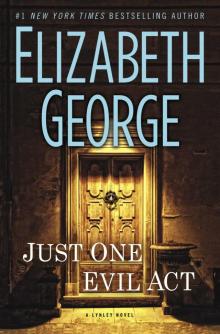 Just One Evil Act
Just One Evil Act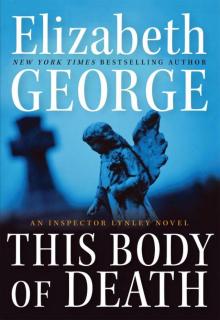 This Body of Death
This Body of Death The Edge of the Water
The Edge of the Water For the Sake of Elena
For the Sake of Elena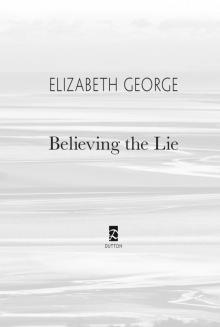 Believing the Lie
Believing the Lie The Edge of the Shadows
The Edge of the Shadows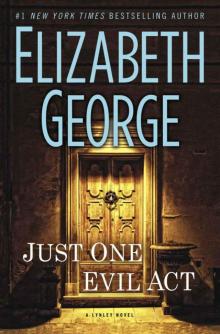 Just One Evil Act: A Lynley Novel
Just One Evil Act: A Lynley Novel In Pursuit of the Proper Sinner
In Pursuit of the Proper Sinner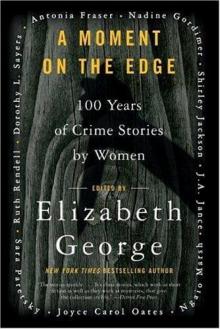 A Moment on the Edge:100 Years of Crime Stories by women
A Moment on the Edge:100 Years of Crime Stories by women Elizabeth I
Elizabeth I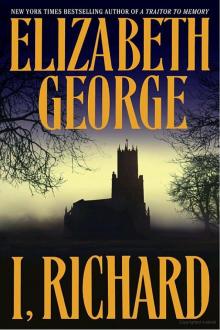 I, Richard
I, Richard A Traitor to Memory
A Traitor to Memory Missing Joseph
Missing Joseph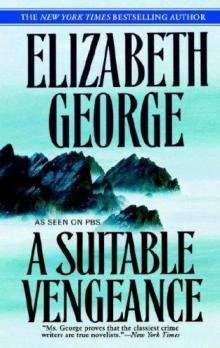 A Suitable Vengeance
A Suitable Vengeance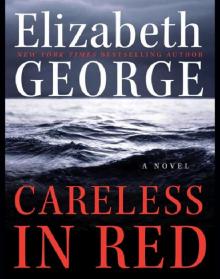 Careless in Red
Careless in Red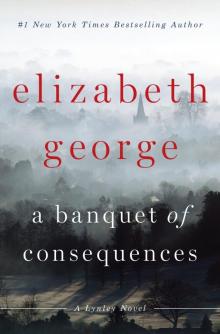 A Banquet of Consequences
A Banquet of Consequences Playing for the Ashes
Playing for the Ashes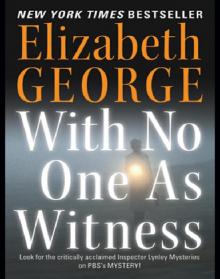 With No One As Witness
With No One As Witness Deception on His Mind
Deception on His Mind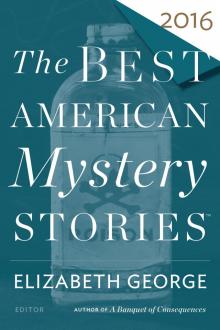 The Best American Mystery Stories 2016
The Best American Mystery Stories 2016 A Great Deliverance
A Great Deliverance In the Presence of the Enemy
In the Presence of the Enemy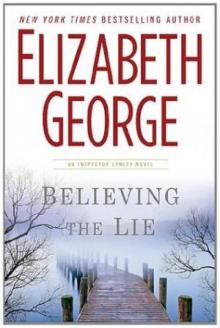 Believing the Lie il-17
Believing the Lie il-17 The Edge of the Light
The Edge of the Light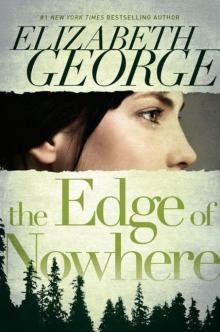 SW01 - The Edge of Nowhere
SW01 - The Edge of Nowhere A Place of Hiding
A Place of Hiding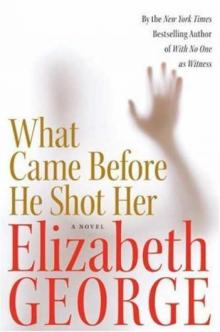 What Came Before He Shot Her il-14
What Came Before He Shot Her il-14 Payment In Blood
Payment In Blood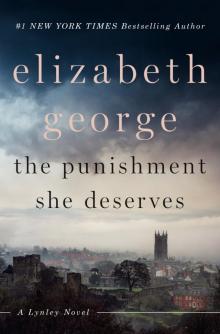 The Punishment She Deserves
The Punishment She Deserves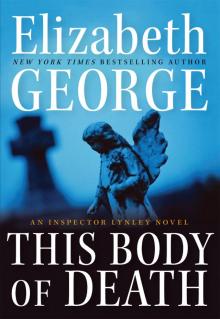 This Body of Death: An Inspector Lynley Novel
This Body of Death: An Inspector Lynley Novel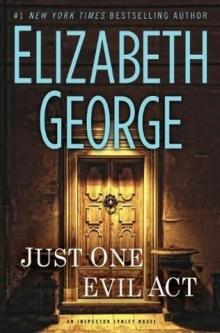 Just One Evil Act il-18
Just One Evil Act il-18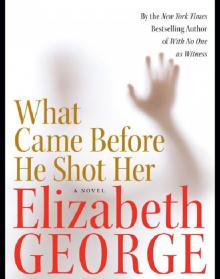 What Came Before He Shot Her
What Came Before He Shot Her Missing Joseph il-6
Missing Joseph il-6